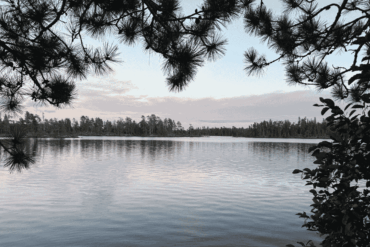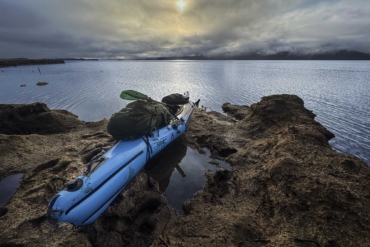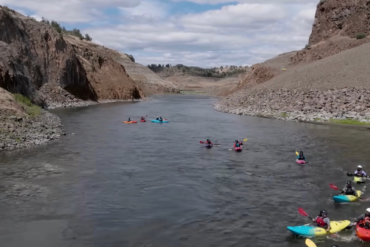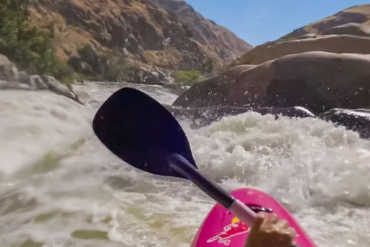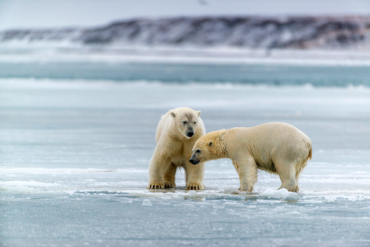Amy and David Freeman paddled out of the Boundary Waters Canoe Area and into history on Friday afternoon, one year to the day since leaving civilization.

For the Year In The Wilderness project, the National Geographic Explorers and GearJunkie contributors spent one complete year within the BWCA.
The Freeman’s goal was to raise awareness about the threat of sulfide-ore copper mining near the pristine lakes and land that make up this paddlers’ paradise.
“I think we have seen progress,” Dave Freeman said. “There’s been some really positive momentum over the past year. The campaign to save BWCA and partners gathered more than 73,000 signatures in a month opposing [mining lease renewals].”
Into The BWCA To Save It
The Boundary Waters Canoe Area is a 1-million-acre wilderness preserve of crystal lakes, rocky islands, and northland forest that stretches nearly 150 miles along the Minnesota-Canada border.

The Freemans, who are married, paddled into the BWCA on Sept. 23, 2015, with the intent to raise awareness for the Campaign to Save the Boundary Waters, an organization dedicated to the permanent protection of the wilderness from development or mineral exploitation. They say proposed mines around the edge of the area would be ecologically damaging to the pristine environment.
“We had peer reviewed science come out in February in the Journal of Hydrology that concluded even under normal operating conditions a mine where Twin Metals proposed to build one would pollute the BWCA,” Dave said.

They paddled out on Sept. 23, 2016, and met a flotilla of well-wishers on Birch Lake in northern Minnesota. Beyond the Year In The Wilderness project, the Freemans previously paddled 2,000 miles from Minnesota to Washington D.C. during the Paddle To DC project.
A Year In The Wilderness: What It’s Like
The Freeman’s camped a few miles from the edge of the wilderness on Thursday, and we caught up with them over a quick phone call before they were met by the flotilla for their exit back to civilization.
What was it like being in the wilderness for that long?
Dave: One of the things that I’ve noticed, over last several months, is our senses have become very sensitive; smelling wild rice as it was getting riper, hearing subtle sounds that now seem very pronounced. If we’re close to the edge of the wilderness, we can smell exhaust. I think our senses have become heightened. It’s something we hadn’t experienced.
As we exit, I think our senses may be overwhelmed.
How is it “living” in the BWCA?
Amy: We’ve gotten used to it, we feel at home out here. We enjoy living in this simplified fashion where everything we own fits in our canoe. Our daily rhythm, we’re really used to it.

What challenges did you face?
Amy: We didn’t know what to expect during freeze-up and thaw. We had this warm winter with El Niño, so travel conditions were never good. It was a particularly slushy winter on the lakes.
Dave: Living out here requires more effort. In some ways it will be nice to turn on a faucet or turn on a light switch. We’ve learned, from being out here so long and in extended journeys, all those things come at a price. We’ll enjoy those comforts, but we’re giving up the simplicity, solitude, silence, and single-minded focus to keep ourselves fed and warm and healthy and share this place. There is a lot value in that, although hardships that come along with it.
What are you looking forward to?
Dave: I’m really looking forward to seeing our parents. I think there will be like 150 people who will see us in a flotilla as we leave.
We’ll get to go eat at a restaurant, and take a shower, and all sorts of things that we can do and haven’t done in a year that will be fun and novel to do.
Learn More, Support The Cause
While they’ve left the wilderness, the Freemans mission is far from complete. They will share the experience during several events and film screenings. The first is scheduled for Minneapolis on Oct. 4.
Show your support today by virtually signing the petition here. Find an event, or learn more at savetheboundarywaters.org.




